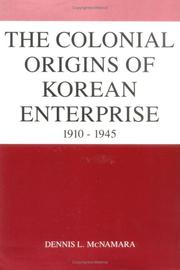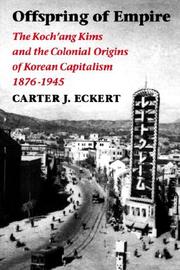| Listing 1 - 4 of 4 |
Sort by
|
Book
ISBN: 9784866581248 4866581247 Year: 2021 Publisher: Tokyo Japan publishing industry foundation for culture
Abstract | Keywords | Export | Availability | Bookmark
 Loading...
Loading...Choose an application
- Reference Manager
- EndNote
- RefWorks (Direct export to RefWorks)
From 1910 to 1945, Korea was a colony of Imperial Japan. Its governance has been described politically in terms of harsh oppression and economically as exploitation and impoverishment. Certainly, there were many problems with Japanese rule in Korea, but how accurate are those claims? What is the connection between the post-war development of South Korea and the socialist regime in North Korea? This book focuses on economic issues, sticks to positivism, and depicts the reality and transformation of Korea during the period of Japanese control.
K9400.70 --- J4390.90 --- J4804 --- Korea: Economy and industry -- history -- Japanese annexation period (1905-1945) --- Japan: Economy and industry -- local economic history and geography -- Remote and others --- Japan: International politics and law -- colonial conditions, organization and administration --- Korea --- Japan --- Economic conditions --- Relations --- J4390.9112 --- Japan: Economy and industry -- local economic history and geography -- remote and others -- Asia -- East Asia -- Korea (South) --- Conditions économiques

ISBN: 0521385652 0521032083 0511528108 Year: 1990 Publisher: Cambridge [England] New York Sydney Cambridge University Press
Abstract | Keywords | Export | Availability | Bookmark
 Loading...
Loading...Choose an application
- Reference Manager
- EndNote
- RefWorks (Direct export to RefWorks)
South Korean conglomerates, or 'chaebol,' such as Hyundai and Samsung, play a far more important role in the Korean economy than do comparable large firms in the US and Japanese economies. Despite the importance of the chaebol to the rapid postwar development of the Korean economy, little has been written about their origins during the Japanese occupation. Through case studies of local ownership in major financial, commercial, and industrial ventures, this book provides a detailed picture of indigenous capitalism during Japanese colonization. Drawing on Japanese government sources, Korean biographies and diaries, interviews and US intelligence material, the author gives a compelling account of key personalities in the Korean business elite and of the personal dilemmas of balancing nationalism against success under dependent, colonial conditions. The author concludes that dependent rather than comprador capitalism characterized leading Korean businesses through 1945. Patterns of concentration within family enterprises, close ties with the colonial state, and mutual support among a Korean inner circle of business leaders constitute a legacy of the colonial period important to the subsequent development of Korean conglomerates.
History of Asia --- anno 1900-1999 --- South Korea --- Corporations --- -K9400.70 --- K9410 --- K9170 --- Business corporations --- C corporations --- Corporations, Business --- Corporations, Public --- Limited companies --- Publicly held corporations --- Publicly traded corporations --- Public limited companies --- Stock corporations --- Subchapter C corporations --- Business enterprises --- Corporate power --- Disincorporation --- Stocks --- Trusts, Industrial --- History --- -Korea: Economy and industry -- history -- Japanese annexation period (1905-1945) --- Korea: Economy and industry -- organization and systems --- Korea: History -- Japanese annexation period (1905-1945) --- Korea --- Economic conditions --- -History --- -Corporations --- -History of Asia --- K9400.70 --- Korea: Economy and industry -- history -- Japanese annexation period (1905-1945) --- Japan --- Korea [South ] --- 20th century --- 1910-1945 --- Japanese occupation, 1910-1945 --- Corporations - Korea (South) - History - 20th century. --- Korea - Economic conditions - 1910-1945. --- Korea - History - Japanese occupation, 1910-1945. --- Social Sciences --- Political Science
Book
ISBN: 9780804759090 080475909X Year: 2009 Publisher: Stanford, Calif.: Stanford university press,
Abstract | Keywords | Export | Availability | Bookmark
 Loading...
Loading...Choose an application
- Reference Manager
- EndNote
- RefWorks (Direct export to RefWorks)
Women --- Factory system --- Employment --- History --- K9170 --- K9300.70 --- K9327 --- K9400.70 --- K9418.60 --- Human females --- Wimmin --- Woman --- Womon --- Womyn --- Females --- Human beings --- Femininity --- Manufactures --- Korea: History -- Japanese annexation period (1905-1945) --- Korea: Social sciences -- social and cultural history -- Japanese annexation period (1905-1945) --- Korea: Communities, social classes and groups -- gender roles, women, feminism, men --- Korea: Economy and industry -- history -- Japanese annexation period (1905-1945) --- Korea: Economy and industry -- labor and employment -- women --- Women - Employment - Korea - History - 20th century --- Factory system - Korea - History - 20th century

ISBN: 0295970650 9780295970653 0295975334 9780295975337 9780295805139 0295805137 Year: 1991 Publisher: Seattle : University of Washington Press,
Abstract | Keywords | Export | Availability | Bookmark
 Loading...
Loading...Choose an application
- Reference Manager
- EndNote
- RefWorks (Direct export to RefWorks)
According to conventional interpretations, the Japanese annexation of Korea in 1910 destroyed a budding native capitalist economy on the peninsula and blocked the development of a Korean capitalist class until 1945. In this expansive and provocative study, now available in paperback, Carter J. Eckert challenges the standard view and argues that Japanese imperialism, while politically oppressive, was also the catalyst and cradle of modern Korean industrial development. Ancient ties to China were replaced by new ones to Japan - ties that have continued to shape the South Korean political economy down to the present day.Eckert explores a wide range of themes, including the roots of capitalist development in Korea, the origins of the modern business elite, the nature of Japanese colonial policy and the Japanese colonial state, the relationship between the colonial government and the Korean economic elite, and the nature of Korean collaboration. He conveys a clear sense of the human complexity, archival richness, and intellectual challenge of the historical period. His documentation is thorough; his arguments are compelling and often strikingly innovative.
Businesspeople --- Capitalism --- Industrial policy --- K9400.60 --- K9400.70 --- K9409 --- K9461.11 --- Business --- Industries --- Industry and state --- Economic policy --- Market economy --- Economics --- Profit --- Capital --- Business people --- Business persons --- Businesspersons --- Entrepreneurs --- Professional employees --- History --- Korea: Economy and industry -- history -- modern period (1860s-[1945]), 20th century general --- Korea: Economy and industry -- history -- Japanese annexation period (1905-1945) --- Korea: Economy and industry -- theory, methodology and philosophy --- Korea: International trade and economic relations (South) Korea -- Asia -- Japan --- Government policy --- Kim family. --- Korea --- Dependency on Japan --- History. --- Businessmen --- Business & Economics --- Economic History --- Business men
| Listing 1 - 4 of 4 |
Sort by
|

 Search
Search Feedback
Feedback About UniCat
About UniCat  Help
Help News
News